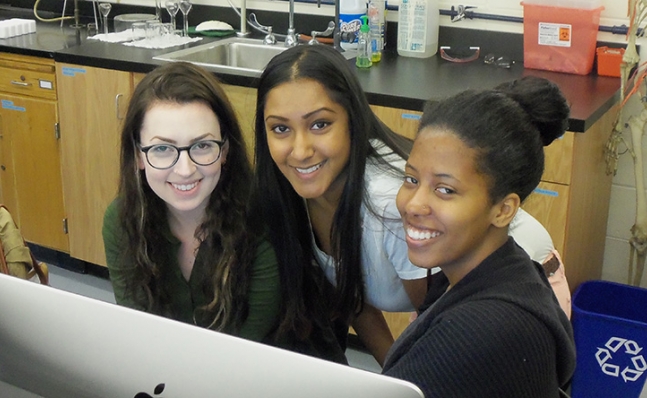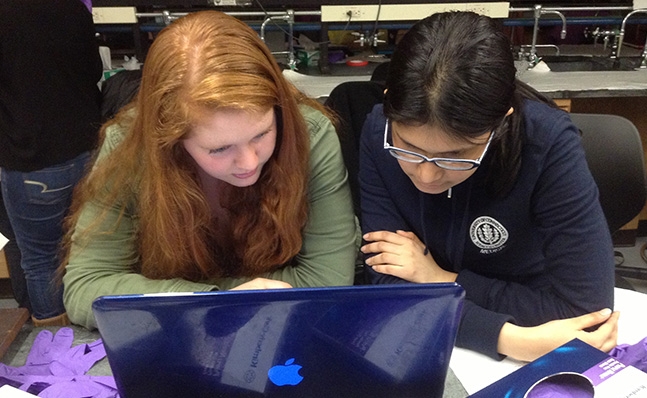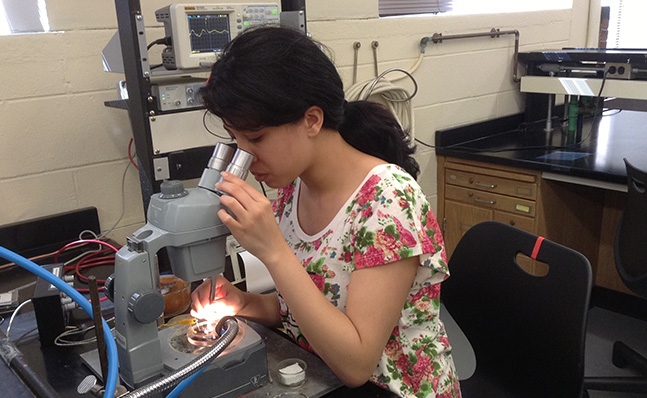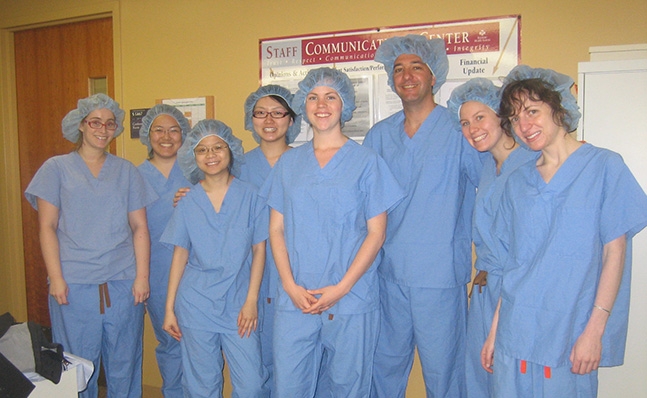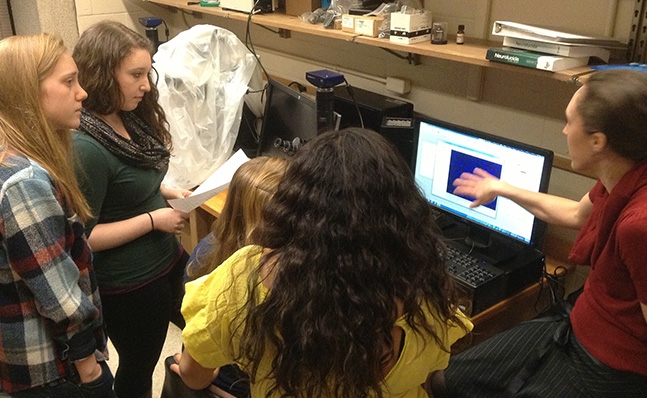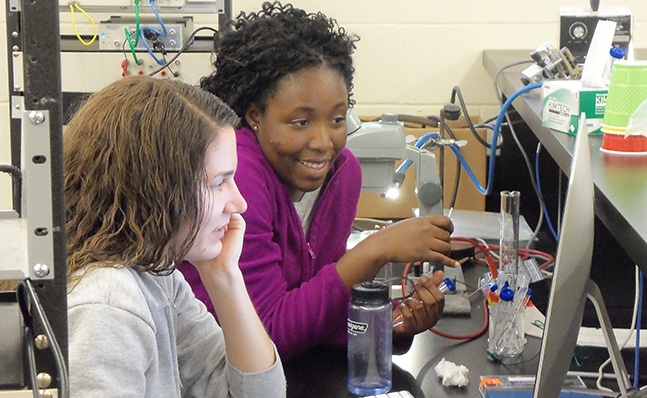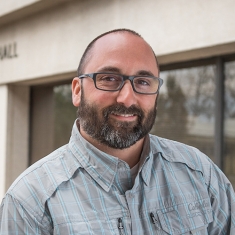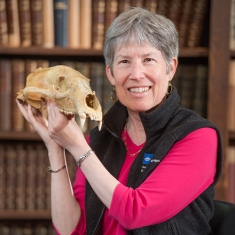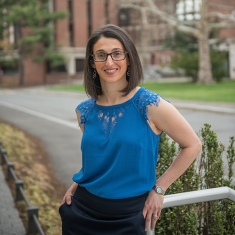Neuroscience
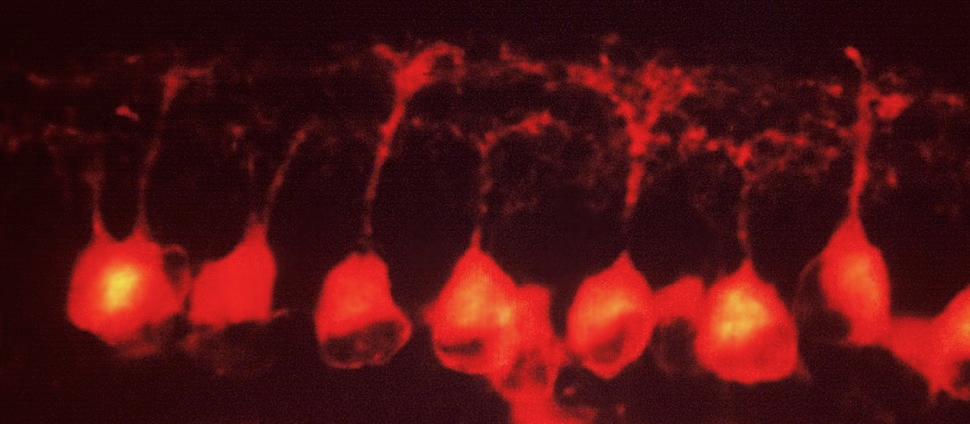
Neuroscience is the study of nervous systems, touching diverse fields such as biology, psychology, biochemistry, philosophy and computer science. Students of neuroscience are also diverse. For example, some students are primarily interested in questions of how consciousness arises from the human brain, while others become fascinated with the inner workings of individual nerve cells, and still others with the development of these complex neural systems. Neuroscience students at Smith receive excellent preparation for a wide range of careers, including research, medicine, biotechnology, pharmacology and more. The breadth of neuroscience encourages learning about many areas of science.
Photo above: Retinal ganglion cells in the eye, stained with a dye crystal placed on the optic nerve. The dye dissolves in the nerve cell membranes and migrates back to the cell bodies and dendrites in the retina. The image was made by the late Stefan Bodnarenko, a professor of neuroscience at Smith.
Neuroscience is the study of nervous systems, touching diverse fields such as biology, psychology, biochemistry, philosophy and computer science. Students of neuroscience are also diverse. For example, some students are primarily interested in questions of how consciousness arises from the human brain, while others become fascinated with the inner workings of individual nerve cells, and still others with the development of these complex neural systems. Neuroscience students at Smith receive excellent preparation for a wide range of careers including research, medicine, biotechnology, pharmacology and a variety of other careers. The breadth of neuroscience encourages learning about many areas of science.
Students who major in neuroscience graduate with deep knowledge of neuroscience and several well-developed skills. They learn fundamental principles about the nervous system at multiple levels of analysis, from molecular and cellular aspects through systems, behavioral and cognitive levels. They receive extensive training in scientific writing, data analysis and public speaking, including presentations in classes and often also at regional and national scientific meetings. All of our students engage in research-based laboratory work, either through research projects in our upper-level laboratory courses, or in many cases through one-on-one mentoring in a faculty research laboratory. Finally, students begin to read primary research papers in our sophomore methods course and then continue to develop their skills in analyzing and critiquing current articles in our upper-level courses and seminars. They graduate from Smith with the skills and understanding that prepares them for the next steps in their careers.
Advisers: Mary Harrington (Study Abroad); Virginia Hayssen (Transfer Students)
Required Core Courses
Take each of these core courses:
BIO 132/133 Cells, Physiology and Development + lab
CHM 111 Chemistry I: General Chemistry (or CHM118) and CHM 222 Chemistry II: Organic Chemistry
NSC 210 Fundamentals of Neuroscience
NSC 230 Experimental Methods in Neuroscience
SDS 201 or SDS 220 (and SDS 100 coreq) Statistics
Take two of these biology courses as part of the core:
BIO 200 Animal Physiology
BIO 202 Cell Biology
BIO 230 Genomes and Genetic Analysis
Advanced Lecture / Research Lab Courses
Take three advanced courses, at least one of which must be a lab course and one a lecture course, from these options:
Lecture courses:
NSC 310 Human Neuroscience
NSC 314 Neuroendocrinology
NSC 318 Systems Neurobiology
BIO 300 Neurophysiology
BIO 302 Developmental Biology
BIO 310 Cell & Molecular Neuroscience
BIO 362 Animal Behavior
Lab courses:
NSC 324 Research in Behavioral Neuroscience
NSC 325 Research Methods in Cellular Signaling
NSC 328 Research in Systems Neurobiology
NSC 334 Research in Computational Neuroscience
NSC 335 Research in Human Neuroscience
BIO 330 Research in Cellular Neurophysiology
BIO 303 Research in Developmental Biology
ESS 310 (with lab) Neuromuscular Control of Human Movement
BIO 363 Research in Animal Behavior
Seminars
Take one seminar from these options:
NSC 312 Seminar in Neuroscience
NSC 313 Seminar in Organismal Neuroscience
NSC 316 Neuroscience in the Public Eye
BIO 323 Topics in Developmental Biology: Regeneration
PSY 314cf Cognition in Film
PSY 315 Seminar in Autism Spectrum Disorders
PSY 326 Seminar in Biopsychology
NSC327 Race and Gender in Neurological Disorders
ESS 300md Seminar: Topics in Exercise Sports Studies - Neuromuscular Mechanisms of Movement Disorders
Elective Courses
Complete one elective course:
PSY 130 Clinical Neuroscience
PSY 218 Colloquium: Cognitive Psychology
PSY 227 Brain, Behavior and Emotion
PSY 230 Psychopharmacology
The neuroscience major requires 51-56 credits, depending on which courses are chosen. A student who places out of required courses with AP or IB credits is expected to replace those courses with others offered in the major. NSC 230 is not open to seniors. NSC 400 Special Studies is S/U grading only. We allow no other S/U credits within the major.
The supplemental website for the neuroscience program provides links to syllabi and other information about selected neuroscience courses.
An updated schedule for the current academic year shows which courses will be taught.
How to Find a Major Adviser and Declare Your Major
The first step in declaring your Neuroscience major is to find a major adviser. The Neuroscience Program seeks to match students with faculty advisers who can best meet their academic advising needs. To be matched with an available adviser, please fill out the file NSC Advising Form and email the completed form to Sarah Lanzoni at slanzoni@smith.edu. You will be notified by email with the name of your new adviser.
To declare your major, fill out the Program of Study Declaration Form. You will enter your new adviser's name on the declaration form.
The neuroscience minor consists of 6 courses.
- BIO 132 Cells, Physiology and Development, or the equivalent
- NSC 210 Fundamentals of Neuroscience
- NSC 230 Experimental Methods in Neuroscience
- Three elective courses, chosen in consultation with the NSC minor adviser from courses that count toward the NSC major, and with at least 2 at the 300 level.
PSY 202 can be substituted for NSC 230, but only if one of the 300-level elective courses is also a lab course.
The supplemental website for the neuroscience program provides links to syllabi and other information about selected neuroscience courses.
Director: Michael Barresi
NSC 430D Honors Project
This is a full-year course. Credits: 4
Normally offered both fall and spring semesters
Please consult the director of honors for specific requirements and application procedures.
Students have the option of counting one semester of Honors as fulfilling the requirement for one Advanced (300-level) Lab course.
For information on your Honors Application please follow this link
Color Code
| 6 Core Courses | 2 Intermediate Biology Courses | 3 Advanced Courses | 1 Seminar | 1 Elective NSC or PSY Course | Liberal Arts Electives | Additional Premed Courses |
Typical Neuroscience Schedule
| First Year | Second Year | Third Year | Fourth Year | ||||
| CHM 111 or 114 or 118 |
CHM 222 | NSC 230 (either semester) | Statistics (either semester) |
Advanced Lecture or Lab | Advanced Lecture or Lab | Advanced Lecture or Lab | Seminar |
| Elective | Bio 132/133 | Intermediate Biology Course | NSC 210 | Intermediate Biology Course | NSC or PSY Elective (either semester) | Elective | Elective |
| Elective | Elective | Elective | Elective | Elective | Elective | Elective | Elective |
| Elective | Elective | Elective | Elective | Elective | Elective | Elective | Elective |
Neuroscience Major, Starting Chemistry and Biology in the Second Year
| First Year | Second Year | Third Year | Fourth Year | ||||
| Elective | NSY or PSY Elective | CHM 111 or 114 or 118 |
CHM 222 | Advanced Lecture or Lab | Advanced Lecture or Lab | Advanced Lecture or Lab | Seminar |
| Elective | Elective | BIO 132/133 | NSC 210 | NSC 230 | Elective | Elective | Elective |
| Elective | Elective | Elective | Statistics (either semester) | Intermediate Biology Course | Intermediate Biology Course | Elective | Elective |
| Elective | Elective | Elective | Elective | Elective | Elective | Elective | Elective |
Typical Neuroscience Major Schedule Meeting Premed Requirements
| First Year | Second Year | Third Year | Fourth Year | ||||
| CHM 111 or 114 or 118 |
CHM 222 | CHM 223 | CHM 224 and/or BCH 252 | Advanced Lecture or Lab | Advanced Lecture or Lab | Advanced Lecture or Lab | Seminar |
| BIO 132/133 | NSC 210 | NSC 230 (either semester) | Statistics (either semester) | English | NSC or PSY Elective | Elective | Elective |
| English | MTH 111h | Intermediate Biology Course | Intermediate Biology Course | Physics 115 | Physics 118 | Elective | Elective |
| Elective | Elective | Elective | Elective | Elective | Elective | Elective | Elective |
Neuroscience Major Schedule, With Junior Year Abroad
| First Year | Second Year | Third Year | Fourth Year | ||||
| CHM 111 or 114 or 118 |
CHM 222 | Intermediate Biology Course | Intermediate Biology Course | Elective Abroad | Elective Abroad | Advanced Lecture or Lab | Advanced Lecture or Lab |
| BIO 132/133 | NSC 210 | Statistics (either semester) | NSC 230 (either semester) | Elective Abroad | Elective Abroad | NSC or PSY Elective | Seminar |
| Elective | Elective | Elective | Advanced Lecture or Lab | Elective Abroad | Elective Abroad | Elective | Elective |
| Elective | Elective | Elective | Elective | Elective Abroad | Elective Abroad | Elective | Elective |
Typical Neuroscience Schedule, With Honors
| First Year | Second Year | Third Year | Fourth Year | ||||
| CHM 111 or 114 or 118 |
CHM 222 | NSC 230 (either semester) | Statistics (either semester) |
Advanced Lecture or Lab | Advanced Lecture or Lab | NSC 430 | NSC 430 |
| BIO 132/133 | NSC 210 | Intermediate Biology Course | NSC or PSY Elective (either semester) | Intermediate Biology Course | Seminar | Elective | Elective |
| Elective | Elective | Elective | Elective | Elective | Elective | Elective | Elective |
| Elective | Elective | Elective | Elective | Elective | Elective | Elective | Elective |
Faculty
Research & Opportunities
Neuroscience students and faculty present their research at national and regional conferences.
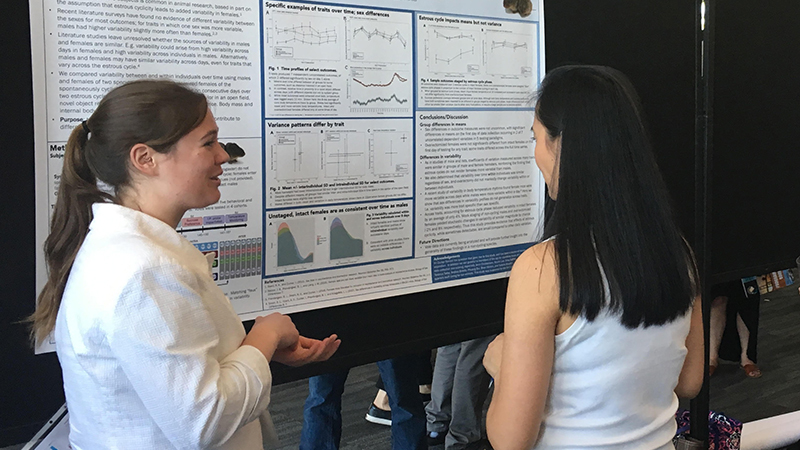
Students at the Society for Behavioral Neuroendocrinology in Long Beach, California.
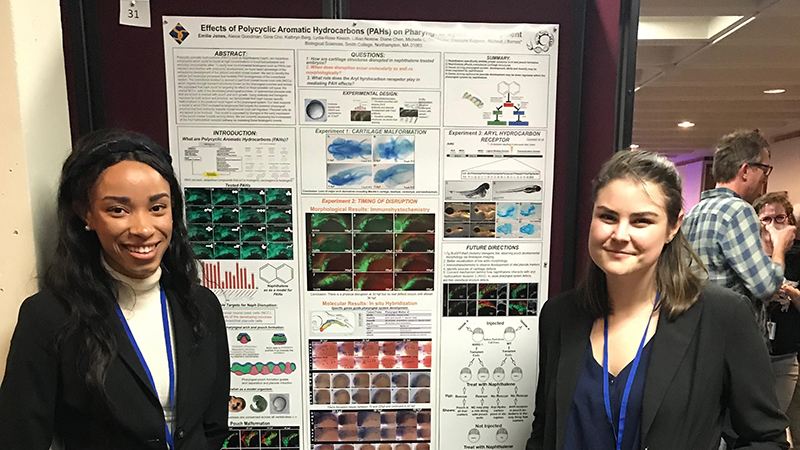
Students at the Northeast Society for Developmental Biology in Woods Hole, on Cape Cod in Massachusetts.

A student discussing her poster at the Society for Neuroscience in San Diego, California.

Students with Professor Mary Harrington at the Society for Research on Biological Rhythms on Amelia Island in Florida.
Study Abroad is possible in neuroscience. Virginia Hayssen is the adviser; interested students should consult her study abroad advice page early in their academic careers to plan their programs.
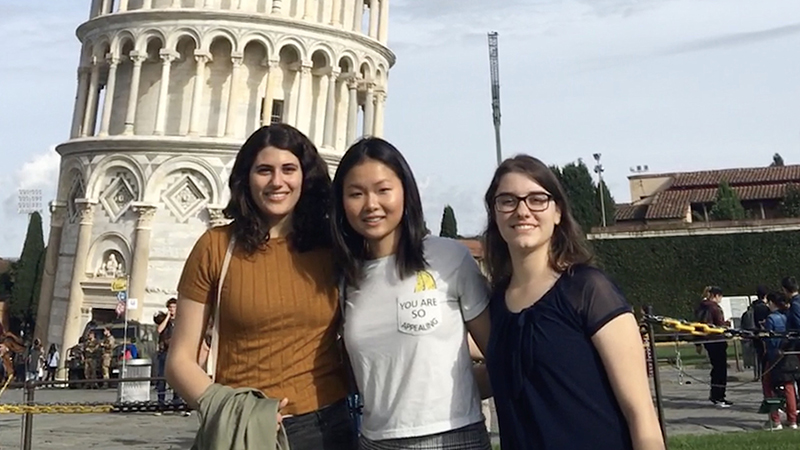
Smith students studying at the Danish Institute in Copenhagen visited Italy during their program’s travel break.
VISIT THE STUDY ABROAD WEBSITE
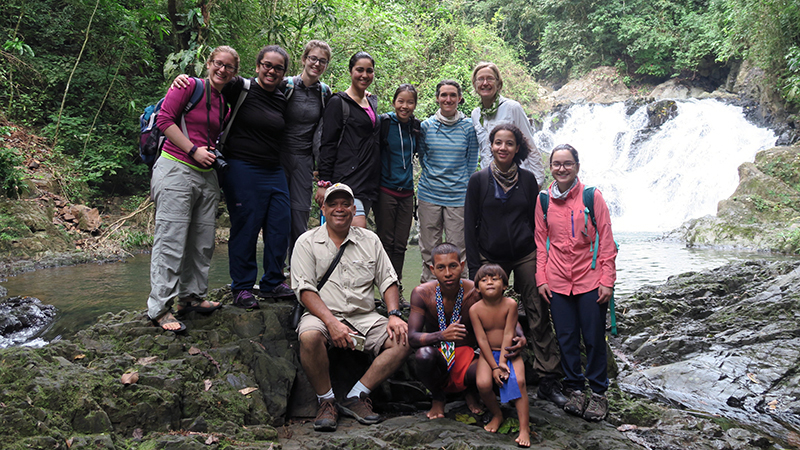
Students in Panama for a two-week course on animal behavior also learned about tribal use of herbal medicines.
- Research by neuroscience faculty receives national attention. Professor Annaliese Beery's analysis of the over-reliance on male subjects in preclinical studies has led to new rules requiring the use of female as well as male subjects in experiments. Beery was awarded the 2015 Frank A. Beach Young Investigator Award from the Society for Behavioral Neuroendocrinology. which recognizes “a new investigator ... who shows exceptional promise for making significant contributions to the field of Behavioral Neuroendocrinology.”
- Professor Mary Harrington and Jean Chaffee Hardwick ’83 have each been president of Faculty for Undergraduate Neuroscience, a national organization that fosters education and research in neuroscience for undergraduate students.
- Professor Richard Olivo received the 2014 award for Education in Neuroscience from the Society for Neuroscience, and two awards from Faculty for Undergraduate Neuroscience, Educator of the Year in 2005 and a Career Achievement Award in 2012. Professor Olivo organizes a teaching workshop each year for the Society for Neuroscience's annual meeting, and he was Founding Editor of the Society's web portal for higher education, Educational Resources in Neuroscience (ERIN).
- Professor Michael Barresi is co-author of an edition of Developmental Biology, the leading textbook in its field. Professor Barresi is a recognized pioneer in the use of instructional technology.
- Professor Virginia Hayssen is the author, with Teri Orr, of Reproduction in Mammals: The Female Perspective. She was formerly senior editor of the Journal of Zoology (London), an international taxonomic journal.
- The cover of an issue of Proceedings of the National Academy of Sciences highlights an article in that issue by Professor Lisa Mangiamele. Her article concerns androgen receptors in leg muscles of a tropical frog that uses its legs for sexual signaling.
- Smith faculty members serve on review panels for the National Science Foundation, the National Institutes of Health, the Beckman Foundation, and as reviewers for numerous journals.
Contact
Ford Hall
Smith College
Northampton, MA 01063

